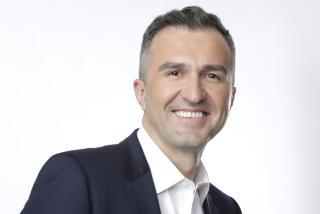Sauter Back at Helm in Shake-Up at CBS News
CBS News, beset by morale problems, companywide budget cuts that forced the firings of 74 employees and continued low ratings for the “CBS Morning News,” got its former president back Thursday, with Van Gordon Sauter named to succeed Edward M. Joyce.
The unusual move had been rumored for two months. Joyce, with CBS since 1954, succeeded Sauter just over two years ago when the latter, during a high-level CBS reorganization, was appointed as one of four executive vice presidents of the CBS broadcast group.
Neither man was available for comment on the changes, which are effective immediately. Joyce now will join the staff of broadcast group President Gene. F. Jankowski as senior vice president of CBS Worldwide Enterprises, which sells programs abroad.
Sauter, CBS News president from 1981 to 1983, will continue in his job at the broadcast group in addition to returning as president of the news division, CBS said, and will have responsibility for the CBS radio division.
Neil Pilson, another group executive vice president who previously was in charge of the radio division, now will be responsible for the five TV stations that CBS owns. Sauter previously supervised the TV stations.
Jankowski, in a statement, said the changes were made because it had become “necessary to reassign a number of responsibilities within CBS broadcast group” because of the early retirement of the group’s senior executive vice president, James H. Rosenfield, who departed last month. Rosenfield had been in charge of finance, operations and development.
Sauter, 50, is a gregarious former reporter who has risen rapidly at CBS during his 17-year career there. Among other things, he has been CBS News’ Paris bureau chief, general manager of KCBS-TV in Los Angeles and president of CBS Sports.
But a certain amount of turmoil attended his previous tenure as head of CBS News and later when he became a top executive at the CBS broadcast group, to which the news division reported. The problems included:
- Gen. William C. Westmoreland’s $120-million suit over a Vietnam documentary that the general alleged had libeled him. The general dropped his suit abruptly early this year after four months of trial. CBS’ legal costs in the case are estimated at $6 million.
- The much-publicized, ill-fated hiring of Phyllis George this year as co-anchor of the struggling “CBS Morning News,” despite her lack of a background in news. George resigned last August, citing a desire to spend more time with her family.
- The equally publicized inquiry in October by Don Hewitt, “60 Minutes” executive producer, on whether CBS, should it ever put up CBS News for sale, would sell it to a group that included Hewitt, anchorman Dan Rather, commentator Bill Moyers and correspondent Mike Wallace.
Hewitt’s query, while promptly rejected, was widely viewed as an indication of unrest and unhappiness in the news division brought on by the 74 firings at CBS News and what some considered a management mentality more devoted to the bottom line than to news.
The firings were part of a companywide cost-cutting drive in the wake of CBS’ expensive battle to resist a takeover attempt by Atlanta cable-TV entrepreneur Ted Turner. The broadcast firm took on an estimated $1 billion in debt during its successful defeat of the Turner bid.
Joyce also was thought part of the problem, sources said Thursday, with a number of staffers regarding him as a cold, withdrawn man whose manner was in sharp contrast to the hail-fellow-well-met ways of Sauter.
Support of Rather
Sauter, despite his 1983 promotion to the broadcast group, nonetheless was considered the man who really ran CBS News. One source said: “Joyce was never really given a chance, so it’s hard to say whether he was bad or good in the job. He was given no leeway.”
This source and several other CBS News staffers who declined to be identified said that Sauter’s return to the presidency of the news division doubtless was strongly supported by Rather, anchor of the top-rated “CBS Evening News.”
Sauter was credited with helping Rather and the show survive a shaky start after Rather succeeded Walter Cronkite as the program’s anchor in March, 1981. As one source put it, Rather remained grateful for that.
“His ‘Evening News’ was pulled out of the fire by Sauter, and he wanted him back,” the source said.
Hewitt, who is thought not to think as highly of Sauter but has emphatically denied reports that he asked for the firings of both Sauter and Joyce when he proposed buying CBS News, was asked in an interview Thursday whether he approved of Sauter’s return. “It’s not up to me to approve or disapprove,” said Hewitt, who was in Beverly Hills on a tour promoting his new book, “Minute by Minute.”
Former CBS News President Richard S. Salant, in a telephone interview from his home in Connecticut, was noncommittal about Sauter’s return, saying only that he was “surprised” by his old network’s decision.
However, Salant added that “if that is what they think is going to bring an end to the damned turmoil there, fine. God be with them.”
More to Read
The biggest entertainment stories
Get our big stories about Hollywood, film, television, music, arts, culture and more right in your inbox as soon as they publish.
You may occasionally receive promotional content from the Los Angeles Times.










